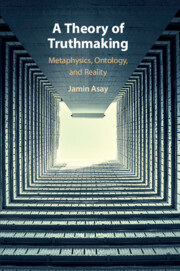Book contents
- A Theory of Truthmaking
- A Theory of Truthmaking
- Copyright page
- Dedication
- Contents
- Preface
- Introduction
- Part I Foundations
- Chapter 1 A Methodology for Truthmaking
- Chapter 2 Truthmaking, Accounting, and Explanation
- Chapter 3 The Truthmaking Relation
- Chapter 4 Truthmaker Maximalism and the Scope of Truthmaking
- Chapter 5 A Catalog of Objections
- Part II Applications
- Part III Metaphysics
- Conclusion
- References
- Index
Chapter 4 - Truthmaker Maximalism and the Scope of Truthmaking
from Part I - Foundations
Published online by Cambridge University Press: 18 April 2020
- A Theory of Truthmaking
- A Theory of Truthmaking
- Copyright page
- Dedication
- Contents
- Preface
- Introduction
- Part I Foundations
- Chapter 1 A Methodology for Truthmaking
- Chapter 2 Truthmaking, Accounting, and Explanation
- Chapter 3 The Truthmaking Relation
- Chapter 4 Truthmaker Maximalism and the Scope of Truthmaking
- Chapter 5 A Catalog of Objections
- Part II Applications
- Part III Metaphysics
- Conclusion
- References
- Index
Summary
Do all truths have truthmakers, or just a proper subset? The chapter adopts the latter answer, and uses the ontological accounting paradigm to defend it. The primary goal in this chapter is to defend nonmaximalism, that is, to defend the existence of legitimate truthmaker gaps: truths without a truthmaker. The goal is not to offer a precise statement of which truths have, and which truths lack truthmakers. Doing so goes against this book’s preferred methodological approach to truthmaking, according to which truths must be treated on a case by case basis. The main ambition, then, is to defend the tenability of truthmaker gaps in general; where exactly they are found is a topic that will surface frequently in the rest of the book, as truthmaker theorists have reasonable disagreements about it. For now, a general defense of non-maximalism is undertaken. A large part of the defense is concerned with meeting the objections that maximalists have offered against their opponents. As it is argued, those objections frequently turn on presupposing an explanatory approach to truthmaking, or on conflating truthmaker gaps with supervenience gaps: truths whose truth does not supervene on being.
Keywords
- Type
- Chapter
- Information
- A Theory of TruthmakingMetaphysics, Ontology, and Reality, pp. 71 - 91Publisher: Cambridge University PressPrint publication year: 2020

